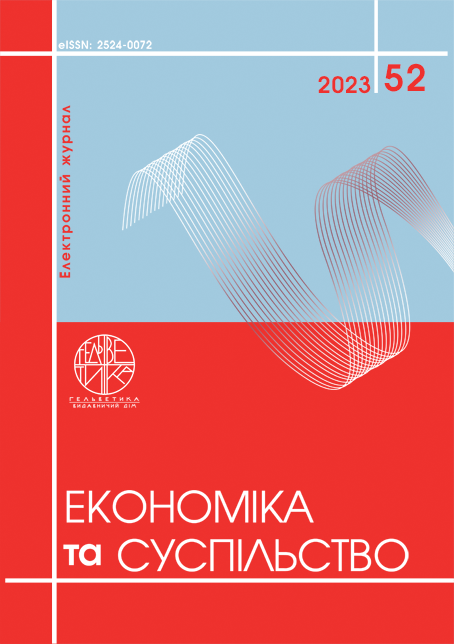HUMAN CAPITAL MANAGEMENT OF THE BUSINESS COMMUNITY IN THE CONDITIONS OF THE KNOWLEDGE ECONOMY
Abstract
The purpose of the article is to reveal the conceptual provisions of human capital management of business communities in the conditions of the knowledge economy. Based on this goal, the following tasks arise when writing the article: to outline the main tasks of the creation and functioning of business communities, to define the essence of a business community, to provide a classification of business communities, to consider the essence and structure of intellectual capital, to determine the essence and features of human capital, to analyze the main characteristics of the knowledge economy and the digital economy. The fact that the issue of human capital management of business communities in the conditions of the knowledge economy has received almost no attention in modern scientific literature makes the research timely and relevant. The methodological basis of the research described in the article are the following methods: analysis and synthesis, statistical, economic and comparative analysis, optimization. These and other methods of scientific research were used in their relationship. The article reveals the essence of the state of the modern world economy, which stands on the threshold of a new qualitative development, the foundations of which are the knowledge economy. The authors determined that knowledge is put forward as the main economic resource in new conditions, and its source is human capital. The article notes that by its very nature, the economy of the nobility contributes to the general decentralization and liberalization of economic relations, therefore, business communities act as incubators for the development of human capital in the business environment. The authors classified business communities, determined their main tasks and features of human capital formation in new conditions. The author's definition of the definitions of “human capital”, “knowledge economy” and “business community” is given in the article, further research directions of the topic are defined, which consist in the development of criteria for the effectiveness of human capital and tools for state stimulation of its development.
References
education
Edvinsson L., Mаlone M. Intellectual Capital: realizing your company’s true value by finding it’s hidden brain-power. New York : Harper Business, 1997, 217 p.
Бурлан С.А., Каткова Н.В. Розкриття інформації про інтелектуальний капітал у звітності підприємства. БізнесІнформ. 2019. №2. С. 354–361. URL: https://www.business-inform.net/export_pdf/business-inform-2019-2_0-pages-354_361.pdf (дата звернення: 2.07.2023).
Пунда О.О., Арзянцева Д.А., Захаркевич Н.П. Теоретична сутність та компонентна структура інтелектуального капіталу. Наука, технології, інновації. 2021. № 3. С. 10–19. URL: http://nti.ukrintei.ua/wp-content/uploads/2022/11/Пунда_3-2021.pdf (дата звернення: 3.07.2023).
Партин Г.О., Загородній А.Г. Інтелектуальний капітал субʼєкта господарювання: сутніть, складники, методи оцінювання. Науковий вісник Херсонського державного університету. 2022. № 45. С. 30–41. URL: https://ej.journal.kspu.edu/index.php/ej/article/view/775/746 (дата звернення: 3.07.2023).
Андрющенко К.А. Інтелектуальний капітал як основа комерціалізації компанії. DOI: https://doi.org/10.32702/2307-2105-2020.8.12
Клименко І.С., Тарануха О.М., Журавель О.В. Інтелектуальний капітал і ринок інтелектуальної власності в умовах інформаційної економіки: проблеми ідентифікації та оцінки. Економіка та держава. 2021. № 5. С. 38–43. URL: http://www.economy.in.ua/pdf/5_2021/9.pdf (дата звернення: 3.07.2023).
Ахновська І.О. Теоретико-методологічні основи формування людського капіталу. Теорія, методологія і практика господарсько-фінансової діяльності підприємств : колективна монографія / Кол. авторів. Полтава : ПП «Астрая», 2019. С. 81–86. URL: http://www.economics.in.ua/2020/01/blog-post.html (дата звернення: 3.07.2023).
Ханін І., Поляков М., Білозубенко В. Про співвідношення концепцій економіки знань і цифрової економіки у формуванні нової парадигми розвитку світового господарства. Проблеми економіки. 2018. № 2 (36). URL: https://www.problecon.com/export_pdf/problems-of-economy-2018-2_0-pages-38_43.pdf (дата звернення: 3.07.2023).
Edvinsson, L. & Malone, M. (1997). Intellectual Capital: realizing your company's true value by finding it's hidden brain power. New York: Harper Business, 217 p.
Burlan, S.A. & Katkova, N.V. (2019). Rozkryttia informatsii pro intelektualnyi kapital u zvitnosti pidpryiemstva [Disclosure of information about intellectual capital in enterprise reporting]. BiznesInform. № 2. P. 354–361. (in Ukrainian)
Punda, O.O., Arziantseva, D.A. & Zakharkevych, N.P. (2021). Teoretychna sutnist ta komponentna struktura intelektualnoho kapitalu [Theoretical essence and component structure of intellectual capital]. Nauka, tekhnolohii, innovatsii [Science, technology, innovation]. № 3. P. 10–19. (in Ukrainian)
Partyn, H.O. & Zahorodnii, A.H. (2022). Intelektualnyi kapital subʼiekta hospodariuvannia: sutnit, skladnyky, metody otsiniuvannia [Intellectual capital of a business entity: essence, components, assessment methods]. Naukovyi visnyk Khersonskoho derzhavnoho universytetu [Scientific Bulletin of Kherson State University]. № 45. 30–41. (in Ukrainian)
Andriushchenko, K.A. (2020). Intelektualnyi kapital yak osnova komertsializatsii kompanii [Intellectual capital as the basis of commercialization of the company]. DOI: https://doi.org/10.32702/2307-2105-2020.8.12 (in Ukrainian)
Klymenko, I.S., Taranukha, O.M. & Zhuravel, O.V. (2021). Intelektualnyi kapital i rynok intelektualnoi vlasnosti v umovakh informatsiinoi ekonomiky: problemy identyfikatsii ta otsinky [Intellectual capital and the market of intellectual property in the conditions of the information economy: problems of identification and evaluation]. Ekonomika ta derzhava [Economy and the state]. № 5. P. 38–43. (in Ukrainian)
Akhnovska, I.O. (2019). Teoretyko-metodolohichni osnovy formuvannia liudskoho kapitalu [Theoretical and methodological foundations of human capital formation]. Teoriia, metodolohiia i praktyka hospodarsko-finansovoi diialnosti pidpryiemstv [Theory, methodology and practice of economic and financial activity of enterprises]. P. 81–86. (in Ukrainian)
Khanin, I., Poliakov, M. & Bilozubenko, V. (2018). Pro spivvidnoshennia kontseptsii ekonomiky znan i tsyfrovoi ekonomiky u formuvanni novoi paradyhmy rozvytku svitovoho hospodarstva [About the relationship between the concepts of the knowledge economy and the digital economy in the formation of a new paradigm for the development of the world economy]. Problems of the economy [Problemy ekonomiky]. № 2 (36). (in Ukrainian)

This work is licensed under a Creative Commons Attribution 4.0 International License.


